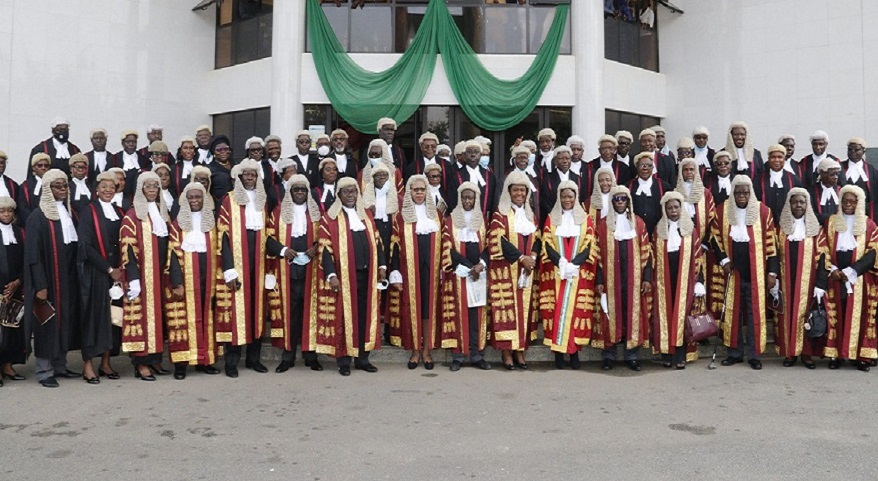By Lillian Okenwa
Senior lawyers have expressed discontent over how election petitions cripple the courts in an election year. However, they all agree that the challenges facing Nigeria’s Judiciary are complex and require a multilayered strategy.
Mrs. Funke Adekoya, SAN had noted that: “Presently ordinary litigants whose taxes fund our court system are treated as “inferior” to the election litigants who can well afford to pay the costs of special judges to be recruited only for election petitions.”
Femi Falana, SAN held that “if fair and free elections are conducted by the Independent National Electoral Commission and state independent electoral commissions, the number of election petitions will be substantially reduced,” and Kunle Edu, Esq. maintains that “ No sane country shuts down its judiciary because of election cases,
Other lawyers have also weighed in, presenting suggestions that could ameliorate the troubles of Nigeria’s judicial sector.
Olajide Abiodun Esq posited that “aside from the suggestions already mentioned, there are other solutions that can be considered to address the issues facing the judiciary in this country.”
Increase funding for the Judiciary: The Constitution already provides for the financial autonomy of the Judiciary, but in reality, the Judiciary still depends on the Executive arm for funding. This creates a situation where the Judiciary is at the mercy of the Executive, and its operations are hampered due to insufficient funding. Increasing the budgetary allocation to the Judiciary will ensure that it has the resources it needs to operate independently and efficiently.
Implement technology-based solutions: Technology can be leveraged to reduce the workload of the Judiciary and make its processes more efficient. For example, electronic filing of court documents can reduce the time and cost associated with manual filing, and video conferencing can be used for remote hearings, thereby reducing the need for physical presence in court.
Address corruption in the Judiciary: Corruption is a major problem in the Judiciary, and it undermines the credibility of the system. Efforts should be made to identify and prosecute corrupt judges and court officials, and steps should be taken to prevent corruption from occurring in the first place.
Improve the recruitment and training of judges: The recruitment process for judges should be transparent and merit-based, and candidates should undergo rigorous training to ensure that they are equipped with the knowledge and skills needed to perform their duties effectively. This will help to ensure that the Judiciary is staffed by competent and impartial judges who can dispense justice fairly and efficiently.
Reduce the workload of the Judiciary: The Constitution prescribes time limits for the hearing of pre and post-election cases, but these time limits can be revised to reduce the workload of the Judiciary. For example, the time limit for filing election petitions can be shortened, and alternative dispute resolution mechanisms can be encouraged to reduce the number of cases that go to court.
In summary, the issues facing the Judiciary are complex and require a multifaceted approach to address. By implementing some or all of the solutions mentioned above, it is possible to improve the efficiency and effectiveness of the Judiciary and ensure that justice is served for all Nigerians.
Another lawyer, V.C Mba had this to say:
“In addition, and without prejudice to the measures adumbrated by @Kunle Edun Esq and O Abiodun Esq, I think it’s even more important to create courts of appeals and supreme courts for the states where most matters emanating from each state would be resolved, while only constitutional matters and matters between the states and federal government and or their agencies go to the federal supreme court, for goodness sake this is supposed to be a federal paradigm of political arrangement.
During the shameful and painful naira redesign fiasco, one of the justices of the supreme court had by way of an obiter decried the situation which has made it possible that all manners of ordinary husband and wife quarrel, landlord slaps his tenant, two factions of motor park touts fights over the control of the collection of tickets from commercial vehicle operators all other inanities end up in the all overcrowded dockets of the supreme court, but no one listened.
I think in addition to and without prejudice to the measures adumbrated and articulated, it’s even more important to create states appellate courts where all cases other than constitutional matters and or matters between the federating subnational units and or their agencies are resolved so that the federal supreme court may concentrate on the real issues, check out other federations and you cannot but agree with me that we’ve got it all wrong.
Above all, can’t we organize and conduct unimpeachable elections adjudged credible, free, and fair enough that even the losers would see no need to go to court? It’s because our elections are not elections properly so-called that warrants a situation where every election is contested and challenged in court, we need to build a robust institutional framework that would make our mostly useless elections tribunals unnecessary.





